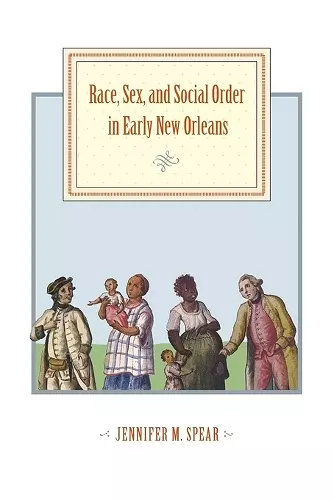Race, Sex, and Social Order in Early New Orleans
Format:Paperback
Publisher:Johns Hopkins University Press
Published:21st Nov '14
Currently unavailable, our supplier has not provided us a restock date
This paperback is available in another edition too:
- Hardback£47.50(9780801886805)

A thoughtful, comprehensive, wide-ranging treatment of the subject of race in New Orleans in the colonial and early national period. It is rare to see a book as thoroughly documented as this one, and as rich in colorful and appropriately chosen examples to illustrate larger points of argument. -- Thomas N. Ingersoll, The Ohio State University A timely, path-breaking, and totally convincing refutation of the prevailing ideologically driven view that all southern whites were always hopeless racists and all women of color were always helpless victims. It helps lay the basis for our new understanding of the diversity of the culture of the USA. -- Gwendolyn Midlo Hall, author of Africans in Colonial Louisiana: the Development of Afro-Creole Culture in the Eighteenth Century By focusing on everyday practice as well as on law and policy, Jennifer Spear vividly explains how free people of color became a significant social group in colonial New Orleans. She takes full advantage of tangibly special circumstances-regional economic conditions, governance by multiple regimes, and rich archival records-to replace stale assumptions about the Crescent City's peculiar society with fresh insights into its comparative importance in early American history. -- Daniel Usner, Vanderbilt University
Strikingly argued, richly researched, and methodologically sound, this wide-ranging look at how choices about sex triumphed over established class systems and artificial racial boundaries supplies a refreshing contribution to the history of early Louisiana.A microcosm of exaggerated societal extremes-poverty and wealth, vice and virtue, elitism and equality - New Orleans is a tangled web of race, cultural mores, and sexual identities. Jennifer M. Spear's examination of the dialectical relationship between politics and social practice unravels the city's construction of race during the eighteenth and early nineteenth centuries. Spear brings together archival evidence from three different languages and the most recent and respected scholarship on racial formation and interracial sex to explain why free people of color became a significant population in the early days of New Orleans and to show how authorities attempted to use concepts of race and social hierarchy to impose order on a decidedly disorderly society. She recounts and analyzes the major conflicts that influenced New Orleanian culture: legal attempts to impose racial barriers and social order, political battles over propriety and freedom, and cultural clashes over place and progress. At each turn, Spear's narrative challenges the prevailing academic assumptions and supports her efforts to move exploration of racial formation away from cultural and political discourses and toward social histories. Strikingly argued, richly researched, and methodologically sound, this wide-ranging look at how choices about sex triumphed over established class systems and artificial racial boundaries supplies a refreshing contribution to the history of early Louisiana.
Break[s] fresh analytical and methodological ground and respond[s] intelligently to alternative explanatory models pertaining to [its] respective subject. [It is a] significant contribution that will elicit scholarly engagement. -- John David Smith Florida Historical Quarterly A sophisticated navigation of the intersections of race, status, and sexuality and the permeability of each boundary. -- Marilyn Westerkamp Journal of Southern History This thoroughly researched, extremely well-documented study gives us a clear understanding of how rulers constantly had to negotiate between what would ensure stability in the colony, what morality commanded, and what their perception of races suggested. -- Nathalie Dessens Journal of American History An impressive study of the role played by race and sex in creating the familiar racial hierarchy of early New Orleans. Among Spear's many contributions is her detailed uncovering of the competing definitions of race as well as arguments about just what relationships between the various races should look like. -- Jeffrey E. Anderson Journal of American Ethnic History Spear opens a window into New Orleanians' legal affairs regarding race under different regimes with distinct legal traditions. -- Anthony J. Stanonis Journal of Latin American and Caribbean Anthropology A wonderful survey of race relations in colonial Louisiana... Bringing things down to an individual level she manages to fuse the micro and macro, creating a layered portrait of colonial society. Her focus on women, their avenues for freedom, and the different responses to their prescribed social role make this interesting for scholars of the regulation of human sexuality, not just race history. -- Katrina Gulliver Itinerario
- Winner of Kemper and Leila Williams Prize in Lousiana History 2009 (United States)
ISBN: 9781421415734
Dimensions: 229mm x 152mm x 22mm
Weight: 499g
352 pages